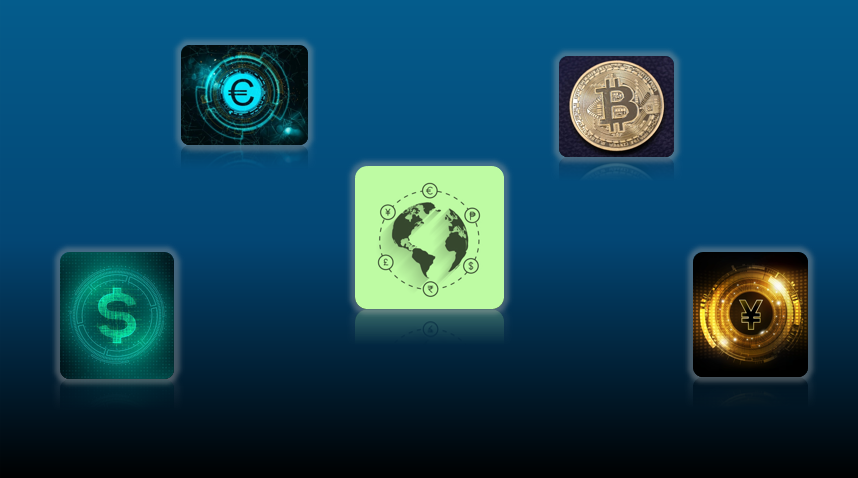Plans behind China’s digital currency
Covid-19 has been the accelerator for digital transformation at many organizations. It has forced companies to relook at their business models. Fear of contagion has made handling physical cashless desirable. The central bank-issued currency notes have also come under the lens and might just get a digital makeover. China has launched its own digital currency called eYuan. Globally, there is a lot of innovation at work on the currency front. Do we need so much innovation in the presently stable form of currency? Is covid the only reason for the rush for digitizing currency notes? Let us find out.
History of Currency
Before we jump into recent innovations, let us look at a bit of the history of currency. The history of exchanges and trades dates back to around 9000 BC. Products or services were exchanged for other products or services under the barter system. The barter system was first recorded in Egypt. In 1100 BC, the Chinese invented casts of bronze, a medium for exchanging goods. This was progress from the existing barter system.
In 1290 AD, the Chinese introduced the concept of paper money to European countries. Paper money started to become mainstream when in 1694, the Bank of England issued currency notes in a regulated format. The history of regulated currency is just about 4 centuries old. Credit cards and contactless transactions were some enhancement on payment methods.
Significant events in the history of currency
One of the significant events associated with the currency changed the global superpower landscape. US President Richard Nixon, during his tenure, made a strategic move that would strengthen the US economy for the decades to come. His deal with Saudi Arabia to trade all petroleum products against US Dollars only. This was a masterstroke from a long-term perspective. Since petroleum products were becoming the fuel for the world, USD became the currency for global trade. It strengthened the US financial system.
Another significant move was shifting away from the restricted printing of currency notes. Currency printing becomes the default go-to mechanism to counter recessions. It was, however, serving the currency wars between global superpowers. For an export-oriented country, undervalued currency makes their offering look cost-effective.
Currency of 21st Century
Digital wallets were the preliminary version of digital currency. These digital wallets allowed their users to make payments using their portable devices like phones and watches. Digital wallets gained good traction thanks to the convenience factor.
Although the major innovation in currencies, however, the launch of Bitcoin. Satoshi Nakamoto, a yet-to-be-identified person, introduced the world to Bitcoin. Bitcoin had novelty, limited availability, and followed distributed ownership principle. With its offering, bitcoin has gained a lot of traction. Bitcoin is scaling new heights every day. With Elon Musk and his electric vehicle organization Tesla; supporting bitcoin big time, it has rapidly doubled in value in about a quarter.
Like bitcoin, there are many other such cryptocurrencies. Central banks do not provide or support cryptocurrencies. It runs on distributed ledgers spread across all its currency holders. There is an upper cap on the total available supply of the cryptocurrency. Facebook also announced that they might launch their own cryptocurrency. Cryptocurrencies led to a fundamental question, do we still need a central bank? Central banks who governed large economies realized; they would become irrelevant if such distributed ledger alternative replaced sovereign currency. They opted for the ‘If you cannot beat them, you join them’ strategy.
What is Digital currency?
Digital currency is basically the digital equivalent of cash. It can be transferred from one account to another. This digital currency cannot be converted to physical cash. Unlike cryptocurrencies, these currencies are issued by the Central bank. One of the examples of a central bank-led experiment is the digital Yuan. People Bank of China (PBOC) is experimenting with its digital currency in 5 cities of China. This experiment is much more than just a digital payment mode. Currently, loosely regulated, WeChat and AliPay dominate the Chinese digital payment landscape. This move will help regain control over digital payments.
Digital currencies will help solve problems of distributing money, reduce black money and even stop terrorist activities. But there is more to digital currencies than just solving a few currency notes related problems.
Chinese Digital currency and its long term plan
Currently, China’s currency accounts for a mere 2% of global cross-border payments, a negligible share compared to the dollar’s 38%. China would obviously be looking at utilizing the first-mover advantage and go global with eYuan. They waived transaction fees between the Yuan and twelve other currencies, a sign to gain global trade share. Chinese technology companies like Didi, Xiaomi, etc. have a significant presence globally. If these companies mandate to transact in eYuan, Yuan shall become gain much ground. Similarly, China has created a strong presence in their neighborhood with the Belt and Road initiative (BRI). They could start influencing the usage of their digital currency.
Global Digital Currencies
Global superpowers are left with no choice, since China is already testing digital currencies. The USA has realized that digital currency is an initiative that would play a vital role in Currency wars. Biden government has already announced its plans to foray into a digital Dollar. European central bank (ECB) could launch a digital currency around the mid of this decade after getting a green light this summer from her fellow policymakers. ECB and the Fed have realized that if cryptocurrencies, wallets, and other country digital currencies take control, their currency and so effectively their power will cease to exist.
Digital currencies will come with a cost. It will also play a critical role in who retains or gains the superpower tag. Though, all this is not going to be straightforward. Like Ex-IMF member Eshwar Prasad mentioned, “If I cannot buy you a coffee without the government knowing about it, I do worry about what this could mean.” Digital currency will give access to almost every aspect of your life to the central banks. The rollout of digital currency may observe many blockers if the privacy aspect is not addressed.
Parting thoughts
Currency has evolved with innovation over many centuries. With rapid innovation, it is expected that currencies would dawn a new avatar. Thie new avatar will have its pros and cons. Though one thing is bound to happen, all central banks are getting a run for their money.
Also Read – How Digital payments are helping tech companies foray into Fintech





